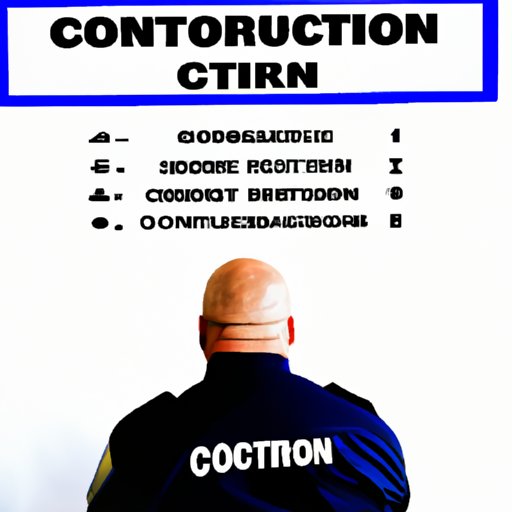Introduction
A correctional officer is responsible for the care, custody, and control of inmates in a prison or jail. They are also responsible for maintaining order, enforcing rules, and providing security in a correctional facility. Correctional officers must have the ability to deal with difficult situations and keep their composure in stressful circumstances.
Qualifications Required to Become a Correctional Officer
There are certain qualifications that an individual must meet in order to become a correctional officer. These qualifications vary from state to state, but generally include a high school diploma or GED, as well as being at least 18 years old. Some states may require additional qualifications such as citizenship, physical fitness, and mental health evaluations.
Education Requirements
In addition to the basic qualifications, most states also require correctional officers to complete some form of formal education or training program. Many states have specific requirements for the type of training required, such as completing a criminal justice degree or certificate program. It’s important to research the exact requirements for your state before beginning any training or educational program.
Training Requirements
Most states require correctional officers to participate in an orientation and training program before they begin working. Training programs typically include topics such as inmate supervision, communication skills, and use of force. In addition, many states also require correctional officers to complete annual training courses in order to maintain their certification.

Benefits and Challenges of the Job
Being a correctional officer can be both rewarding and challenging. It is a job that requires dedication and a commitment to public service. Here are some of the benefits and challenges of working as a correctional officer.
Benefits
One of the main benefits of working as a correctional officer is the sense of satisfaction that comes from serving one’s community. Correctional officers also enjoy a steady salary, excellent benefits, and job security. According to a study conducted by the Bureau of Labor Statistics, the median annual wage for correctional officers was $44,330 in 2019.
Challenges
Working as a correctional officer also has its challenges. The job can be physically and emotionally demanding, and it can involve dealing with difficult and dangerous situations. Correctional officers must also be prepared to handle inmates who may be hostile or uncooperative.

Roles and Responsibilities of a Correctional Officer
The primary role of a correctional officer is to ensure the safety and security of inmates and staff within the correctional facility. To do this, correctional officers must supervise inmates, enforce rules, and maintain order. Here are some of the other roles and responsibilities of a correctional officer.
Supervising Inmates
Correctional officers are responsible for monitoring the activities of inmates and ensuring they follow the rules of the facility. This includes conducting searches and inspections of inmates, monitoring behavior, and responding to any incidents that may arise.
Maintaining Security
Correctional officers must also be vigilant in maintaining the security of the facility. This includes performing regular patrols, inspecting doors and windows, and using surveillance equipment. Correctional officers must also be prepared to respond to any potential security threats or breaches.
Enforcing Rules
It is the responsibility of correctional officers to enforce the rules of the facility. This includes disciplining inmates for violations, issuing warnings, and documenting incidents. Correctional officers must also be familiar with all laws, regulations, and policies related to their job.
Professional Skills Needed to Excel in the Field
In addition to the qualifications and training required to become a correctional officer, there are certain professional skills that are needed to excel in the field. These skills include strong communication, conflict resolution, and interpersonal skills. Here are some of the professional skills needed to excel as a correctional officer.
Communication Skills
Good communication skills are essential for correctional officers. They must be able to effectively communicate with inmates and other staff members, as well as handle difficult conversations. Correctional officers must also be able to write clear reports and document incidents.
Conflict Resolution Skills
Corrections officers must be able to handle difficult situations and resolve conflicts between inmates. They must be able to remain calm in tense situations and use de-escalation tactics when necessary. Conflict resolution skills are essential for correctional officers.
Interpersonal Skills
Interpersonal skills are also important for correctional officers. They must be able to establish trust and rapport with inmates and other staff members. Correctional officers must also be able to work collaboratively with others in order to achieve their goals.

Tips on How to Handle Difficult Situations
Working as a correctional officer can be a challenging and potentially dangerous job. Here are some tips on how to handle difficult situations:
Remain Calm
It is important to remain calm when handling difficult situations. Staying calm will help you think clearly and make better decisions. It is also important to remember that inmates are often trying to provoke a reaction, so it is best to stay professional and not take the bait.
Follow Protocols
When handling difficult situations, it is important to follow the protocols set forth by the facility. This includes following established procedures for responding to incidents and ensuring that all rules and regulations are followed.
Use De-escalation Tactics
Whenever possible, it is best to use de-escalation tactics to defuse a situation. This includes using verbal techniques such as active listening, staying positive, and redirecting the conversation. It is also important to remain aware of the inmate’s body language and be prepared to respond accordingly.
Conclusion
Working as a correctional officer can be a rewarding and challenging career. It requires dedication and a commitment to public service. In order to become a correctional officer, individuals must meet certain qualifications, receive the necessary education and training, and possess the necessary skills. The benefits of working as a correctional officer include a steady salary, excellent benefits, and job security. However, the job also has its challenges, such as dealing with difficult and dangerous situations. Ultimately, becoming a correctional officer requires dedication, hard work, and a commitment to public service.
(Note: Is this article not meeting your expectations? Do you have knowledge or insights to share? Unlock new opportunities and expand your reach by joining our authors team. Click Registration to join us and share your expertise with our readers.)
